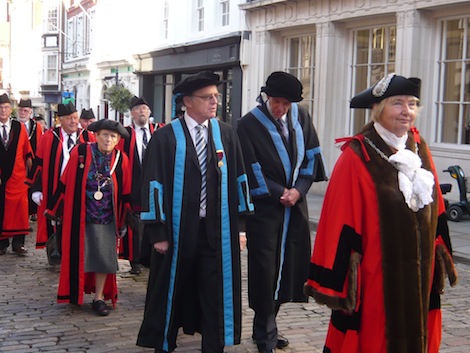 Abraham Lincoln
If given the truth, the people can be depended upon to meet any national crisis...
Abraham Lincoln
If given the truth, the people can be depended upon to meet any national crisis...
 Guildford news...
for Guildford people, brought to you by Guildford reporters - Guildford's own news service
Guildford news...
for Guildford people, brought to you by Guildford reporters - Guildford's own news service
The Dragon Says: Former Councillors Should Speak Up and Speak Out Too
Published on: 19 Oct, 2012
Updated on: 19 Oct, 2012
 Honorary Freemen and Honorary Aldermen should be seen but not heard. That seems to be the view of many councillors at Millmead.
Honorary Freemen and Honorary Aldermen should be seen but not heard. That seems to be the view of many councillors at Millmead.
A few months ago all the party leaders signed a letter criticising one Honorary Alderman as ‘silly’ for daring to criticise the council. After thought, two of them withdrew their support but such a claim did seem an extraordinarily over-the-top reaction about someone simply exercising a right of free speech.
A few weeks later, in a change to normal procedure, Hon Freemen and Aldermen were no longer summoned to council meetings and their presence or apology no longer recorded in the minutes. It seems no one bothered to tell the Freemen, Aldermen or the existing councillors.

Some of Guildford’s Honorary Freemen and Honorary Aldermen, led by the Deputy Mayor, in procession earlier this month
It is true that it was not an important change: no one even noticed until recently, but it revealed a petty and vindictive streak within those who made the decision, and the botched communication appeared rude.
What caused this reaction? It would seem that there is a belief and a tradition that past councillors, who have been recognised for their public service by being made an Hon Freeman or Alderman, should not engage, publicly at least, in local political issues.
But is that really the case? When national politicians are elevated to the House of Lords no one turns a hair if they comment on government policy or issues. It is considered to be a part of their role to make pronouncements based on their experience and wisdom.
So why shouldn’t we hear what our former councillors have to say? They have years of experience to draw on and their commitment to our town cannot be doubted.
They don’t pretend to be speaking from a party political standpoint. Indeed, they attract criticism from their former colleagues in their parties. Some say that the public might not understand their Honorary status i.e. that they are no longer active councillors.
But is that true and, if so, so what? Most of the population don’t even vote in local elections and many of those who do could not name their ward councillors. If a few comments from former councillors attract extra interest in local issues so much the better.
There is nothing in any rule or regulation to prevent them speaking as they wish. They have the same right to free speech as the rest of us and it might be more important for them to exercise it than most.
So the Guildford Dragon NEWS says the council need to be less sensitive to criticism. They should understand that it comes with the turf when you obtain political power. It is actually a sign of health and rigour in our local democracy.
Everyone, Honorary Freemen, Honorary Aldermen, Councillors and electors, should speak up and speak out. Everyone’s view is important and should be heard, especially perhaps those whose dedication to public service has been recognised.
The honorary types do add colour to our processions and ceremonies. They form part of our important traditions that have their roots in citizens showing the control they had over their own town.
But these honoured men and women should not be treated as some kind of decorative walking manikins. They still have brains. Let us hear what they have to say and let there presence be noted at council meetings too. It is a tiny enough privilege. What harm can it do?
Responses to The Dragon Says: Former Councillors Should Speak Up and Speak Out Too
Recent Articles
- Letter: Those in Elected Office Should Refrain from Deliberately Misleading the Public
- Cup Run Ends After City Fade in Second Half
- Press Regulator Condemns Behaviour of News Group Newspapers
- MP Says Raw Sewage Flooding Gardens is ‘Absolutely Disgusting’ – ‘Thames Water Must Stop It’
- Opinion: We Should Restore Clandon House
- Letter: Report on Councils’ Collaboration Benefits Has Been Over-hyped
- Council Tenants Unhappy With the Way GBC Handles Their Complaints
- Police Operation Puts Drug Gang Members Behind Bars
- Declaration Marks 750th Anniversary of a ‘Dark Day in Guildford’s History’
- Letter: For Democracy to Work We Need to Engage


Recent Comments
- Anthony Mallard on Opinion: We Should Restore Clandon House
- Heather Evans on Council Tenants Unhappy With the Way GBC Handles Their Complaints
- Michael Foster on Regulator Finds ‘Serious Failings’ in GBC’s Council Housing Safety Compliance
- Dave Middleton on Council Tenants Unhappy With the Way GBC Handles Their Complaints
- Jane Austin on Reported Council Collaboration Savings Contested By Opposition Councillors
- Andrew Few on Memories Of The Young Eric Clapton at Guildford’s Harvest Moon Club
Search in Site
Media Gallery
Dragon Interview: Local Artist Leaves Her Mark At One of England’s Most Historic Buildings
January 21, 2023 / No Comment / Read MoreDragon Interview: Lib Dem Planning Chair: ‘Current Policy Doesn’t Work for Local People’
January 19, 2023 / No Comment / Read MoreA3 Tunnel in Guildford ‘Necessary’ for New Homes, Says Guildford’s MP
January 10, 2023 / No Comment / Read More‘Madness’ for London Road Scheme to Go Ahead Against ‘Huge Opposition’, Says SCC Leader
January 6, 2023 / No Comment / Read MoreCouncillor’s Son Starts Campaign for More Consultation on North Street Plan
December 30, 2022 / No Comment / Read MoreCounty Council Climbs Down Over London Road Works – Further ‘Engagement’ Period Announced
December 14, 2022 / No Comment / Read MoreDragon Interview: GBC Reaction to the Government’s Expected Decision to Relax Housing Targets
December 7, 2022 / No Comment / Read MoreHow Can Our Town Centre Businesses Recover? Watch the Shop Front Debate
May 18, 2020 / No Comment / Read More









Gordon Bridger
October 21, 2012 at 5:01 pm
Congratulations on a thoughtful and helpful comment on this issue. I hope we get more thoughtful responses of this in future.
As one of the seven Hon. Aldermen who broke the hitherto code of silence which has existed for decades I hope more of my colleagues will do so in future.
They could be invited to speak at full council meetings on topics on which they have knowledge and experience. Councillors might welcome such contributions.
For example few current councillors are aware of the way the Committee system, which the Government unwisely abolished about six years ago, worked. They instituted the Executive system – on the grounds that the committee system was too clumsy.
What then occurred was that a fortunate nine councillors were given power and the remaining 39 were effectively sidelined. A return to the Committee system would allow them to serve on Committees which would vet reports before they got to the Executive. Thus they could make a positive contribution towards reports and highlight errors.
The Government in its Localism Bill now allows a reversion to this system.
If I were one of the 39 Councillors excluded I would certainly be asking for it to be reinstated.
Keith Chesterton
October 23, 2012 at 8:27 am
It has been a mystery to me why people want to be an Honorary Alderman (not that I’ve ever been asked). What benefit is there in listening to a lot of mostly tedious speeches, without being able to speak yourself? Even less if you are expected to keep quiet outside the council meeting as well as in it.
So Gordon Bridger is completely right when he says everyone including Honorary Aldermen and Freemen have the a right to speak out – though others have done so besides him. For example Bill Bellerby campaigned very effectively, but unfortunately unsuccessfully, to retain the town centre shuttle bus.
But one point. There is nothing in the current Executive system that prevents reports going to the Scrutiny Committees before they go to the executive. A well run council would do precisely that on major issues. Let us hope under the new “Leader”, the council leadership will, as well as taking notice of what the public say, involve its own councillors more.
Keith Chesterton ex-Councillor.
Bernard Parke
October 23, 2012 at 12:59 pm
Who in reality would give up their democratic right of free speech in return for wearing a red robe about three times a year?